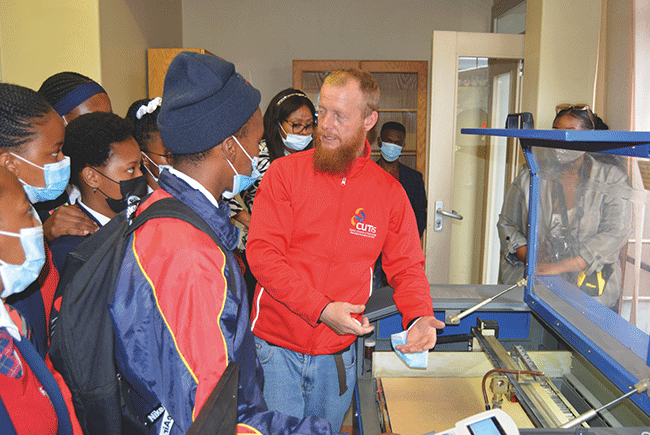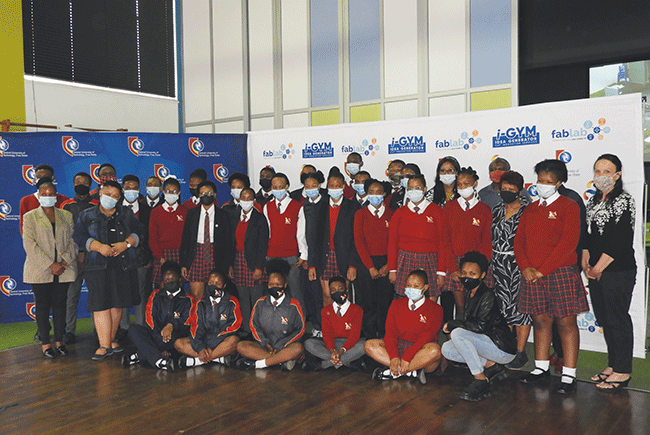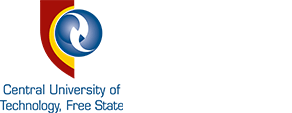The need for a workforce imbued with science, technology, engineering and mathematics (STEM)-based competencies, to adequately contribute to socio-economic growth resonates across the globe. This has culminated in increased efforts towards the development and implementation of STEM centres and programmes across the country. The NDP 2030 proposes that the country must meet a target of 450 000 learners who qualify to study towards a STEM bachelor qualification by 2030.

The STEM Academy was established to promote STEM, innovation and entrepreneurship among school learners. The academy is a partnership between the Central University of Technology, Free State (CUT) and the Free State Department of Education (FSDoE). Launched in 2018, its goal is to support the department in delivering quality education in schools. Through the services offered by the academy, school learners benefit from exposure to relevant material and facilities that increase their understanding of the subjects they learn in school. The programmes also broaden learners’ perspectives in terms of STEM careers, and inspire them to consider entrepreneurship as a career choice. Teachers’ skills are improved through regular workshops that are facilitated by experts in STEM fields.
Four strategic pillars underpin the academy’s many projects and activities, namely upstream intervention (primary and secondary school learners); teacher development; the annual STEM Conference; and research.
The STEM Academy supports CUT’s Vision 2030, which states that ‘by 2030, Central University of Technology, Free State will be a leading African university of technology, shaping the future through innovation’.

STEM Academy participants and officials will be seen as ambassadors of innovation, development, robotics education and maths and science within the country and, for this reason, the academy is considered the driving force of innovation for scholars within the central region and SA as a whole.
PRIORITY PROJECTS
STEM Acceleration programme
The development of a STEM Acceleration programme is under way. A compressed version thereof was implemented by CUT’s Faculty of Engineering, Built Environment and Information Technology in 2021. Its purpose is to improve the performance of learners who are interested in pursuing STEM studies but do not meet the minimum entry requirements. The programme will assist in creating a pipeline for STEM and contribute towards the maths, science and engineering targets set in the NDP. It will also address learners who dropped mathematics at Grade 11 but want to elevate their level of maths in order to pursue further studies/careers that require maths.

Survey on poor maths performance in the Free State
A study to determine the root causes of poor performance in the Free State province has been developed. Questionnaires will be distributed to schools to investigate the quality of teachers, learner retention, resources and support provided (and their impact); and the reasons for poor viewership of maths videos, compared to physics. In 2022, officials from the curriculum section of the FSDoE as well as the MEC for education will be interviewed as part of the study.
STEM conference
The conference, Teaching Mathematics During COVID-19, aims to bring together theoretical and experimental researchers working on the application of maths in the real world. The main topics of the conference comprise both a modelling of mathematical situations in real life and the teaching of maths during a pandemic.
Technical maths teacher training
A programme for training teachers is under development by CUT’s Faculty of Humanities. In the meantime, the FSDoE will run teacher workshops, separate from the ones planned by CUT, while awaiting the development of a teacher programme.
CURRENT/PAST PROJECTS
Maths and Natural Sciences project
The Maths and Natural Sciences project is an initiative of CUT’s Faculty of Humanities. It is implemented under the ambit of the STEM Academy in collaboration with the Department of Mathematics, Science and Technology Education. The project aims to improve learner performance and increase retention in maths and the sciences.
In 2021, the CUT unit for development and fundraising applied for funding from the Old Mutual Foundation (OMF) to provide extra tuition to 596 Grade 8 and Grade 9 learners from Lenyora la Thuto Comprehensive School. The application was approved and an amount of R350 000 was granted by the OMF. Twenty-four professional teachers and CUT lecturers were appointed to conduct classes on Saturdays at this school.
The greater plan of the STEM Academy is to help the institution build internal capacity to be able to cover at least five to 10 schools per annum. For the STEM Academy to continue having these projects, these initiatives will reflect a driving factor for increased return on investment for the institution and prospective funders on a consistent basis.
Robotics project
The Robotics project is spearheaded by the Department of Electrical Engineering and implemented under the ambit of the STEM Academy. When the project was initiated in 2019, the plan was to set up clubs at schools with several activities being undertaken to expose learners to robotics and prepare them for the roll-out of the curriculum in this subject. However, the plan was thwarted due to the pandemic in 2020. As a result, the project started with 40 learners attending workshops at CUT instead of setting up clubs at schools.

The easing of lockdown restrictions and the rotational attendance of classes by school learners in 2021 presented an ideal opportunity for the project team to explore the possibility of implementing the project at schools as initially planned. It was at this stage that a funding proposal was submitted to the OMF. Subsequently, an amount of R164 760 was granted by OMF to run the project at two schools in the province. The schools were requested to identify 20 Grade 8 learners to participate in the project. In total, 40 learners took part in 2021. Two facilitators were appointed to conduct three-day workshops per school on robotics and programming. The STEM Academy intends to be the hub of robotics and maths and science in SA and sub-Saharan Africa by 2026, with collaborating efforts from all divisions within the institution.
Physical sciences teacher training
Maths and science education in the country has been faced with fundamental and systematic challenges, which have been exacerbated by the condensed school calendar due to the COVID-19 pandemic. The South African Institute of Physics (SAIP) and CUT conducted a series of physical science teacher-development workshops for the Free State province from 4 to 8 October 2021, with support from the Philanthropy Initiative by employees of Allan Gray. Parallel workshops were held at CUT’s Bloemfontein and Welkom campuses, as well as virtually.

The SAIP’s primary goal is to improve physics education and research, and develop and nurture the next generation of physicists in SA. Physics is a fundamental science that underpins the development of all other science, engineering, and technology disciplines. Studying physics imparts transferable quantitative reasoning, critical thinking and problem-solving skills that are valuable in areas such as medicine, engineering, ICT, big data, AI, astronomy, financial analysis and investment management, among others. Currently, workshops are being run online on Saturdays and during recess. These workshops are open to teachers across the entire country.
American Consulate STEAM Club
The United States Mission in South Africa, through the Public Affairs sections at its embassy and consulates, manages the American Spaces programme at eight sites in SA, with a variety of partners. These facilities are geared towards stimulating the interest of young people in STEAM subjects and encouraging them to pursue STEAM-related careers. Grade 10 and Grade 11 learners from Navalsig High School participate in this club, and its activities are hosted at the Mangaung library.









